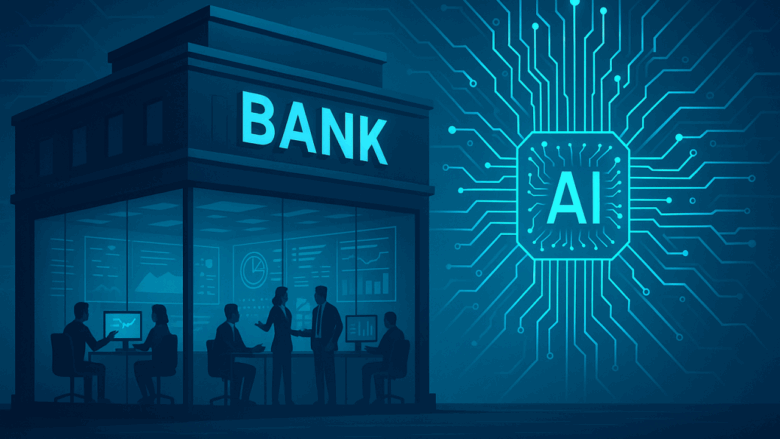Digital banking is undergoing a dramatic transformation, with artificial intelligence (AI) as the main driving force. Once viewed as a futuristic technology, artificial intelligence (AI) now plays a crucial role in banking operations, enabling banks to provide smarter, faster, and more personalized banking services. AI is transforming the way banks interact with customers and conduct their business. It can automate routine tasks and more easily identify fraud. Customers today expect a seamless and easy digital experience. AI helps banks deliver this experience through intelligent applications, predictive analytics, and personalized recommendations. AI can also help banks reduce costs while improving efficiency and security, significantly benefiting both banks and their customers. The rise of AI in digital banking is more than just a technological revolution; it’s about rethinking how money is handled in a safer, more connected, and more customer-focused world. As AI becomes increasingly popular, it is setting new standards for improved banking services worldwide.
How AI Plays a Role in Modern Banking
AI was once just a tool, but it has become an essential part of today’s banking ecosystem. Banks are now using AI to analyze vast amounts of financial data, make smarter decisions, and perform complex tasks that previously required manual labor. For example, AI algorithms can quickly determine a person’s creditworthiness, speeding up loan applications and improving accuracy. AI is also being used for robo-advisors, which use real-time market analysis to help customers make investment decisions. On the user side, AI-powered chatbots and virtual assistants now answer millions of questions daily, making service available anytime, anywhere. By using AI, banks not only improve efficiency but also enhance the customer experience by providing more personalized service at the right time. This fundamentally changes how banks operate, making banking smarter and more user-friendly than ever.
AI and Better Customer Service
The ability to transform the customer experience is one of AI’s strengths in digital banking. Traditional banking was once considered slow, rigid, and impersonal, but AI is changing that perception. Intelligent chatbots can quickly answer customer questions, provide account information, and even assist with shopping. Predictive analytics can help banks understand customer behavior and make personalized recommendations, such as savings plans or investment options. AI also enables speech recognition and biometric authentication, making online banking easier and more secure. Customers receive seamless, real-time support, and banks gain a deeper understanding of their needs. This personalized approach not only leads to satisfied customers but also builds their trust and engagement over time. Artificial intelligence (AI) is expected to continue improving, making digital banking more intuitive, predictive, and user-friendly.
Using AI to Detect Fraud and Address Risks
While fraud has always been a major challenge for the banking industry, AI makes it easier to prevent and address it. In the past, fraud detection systems often relied on fixed rules, making them slow to respond to emerging threats. AI, on the other hand, uses machine learning to immediately detect unusual trends and transactions. AI can quickly identify potential fraud by analyzing vast amounts of data. This allows banks to take immediate action before losses occur. AI also enhances risk management by using advanced data models to predict potential defaults and financial risks. This proactive approach not only ensures the security of banks but also protects customers from fraud losses. AI also continuously learns and improves, increasing its fraud detection capabilities over time. With the evolving threat landscape, AI is becoming a crucial defensive tool for ensuring the security and reliability of digital banking.
AI and the Future of Digital Banking
Advances in artificial intelligence (AI) will significantly impact the future of digital banking. As technology evolves, banks must move beyond simple automation and embrace AI tools such as natural language processing, deep learning, and predictive models. These new technologies enable banks to offer highly personalized services, handle complex investment plans, and engage customers more effectively. AI is expected to play a key role in financial inclusion and make banking more accessible to the unbanked through the use of mobile apps and smart digital solutions. However, several challenges remain, including ethical issues, data protection concerns, and the need for a regulatory framework. Even with these challenges, the benefits of AI far outweigh the risks, and its adoption will only increase. In the coming years, AI will not only enhance digital banking but also transform it, making the entire financial system smarter, more secure, and more accessible to everyone.
Conclusion
The financial sector is undergoing a transformation that is fundamentally changing everything. AI is more than just a trend in digital banking. It opens the door to online banking, improving the customer experience, strengthening security, streamlining processes, and creating new opportunities. Customers today demand speed, personalization, and trust, and AI helps banks achieve all of this. While some issues, such as data protection and ethical considerations, still need to be addressed, AI is undoubtedly gaining popularity. As AI advances, it empowers banks to surpass their existing roles and transform into significant financial collaborators in individuals’ lives. Digital banking extends beyond transactions, striving to enhance the financial system’s intelligence, security, and customer-centric approach. AI is changing the way digital banks operate and shaping the future of money.
FAQs
1. What role does AI play in online banking?
Digital banking uses AI through chatbots and predictive analytics to streamline services, detect fraud, provide personalized recommendations, and enhance the customer experience.
2. Do you think AI can make banking more secure?
Yes, AI improves security by identifying anomalies in real time, preventing fraud, and using biometrics to strengthen safety, making online transactions more secure.
3. What AI-powered chatbots are available in the banking sector?
AI-powered chatbots act as virtual assistants: they answer customer questions, provide account information, and guide users through transactions without human intervention.
4. Will AI replace bank employees?
AI will not completely replace human employees; rather, it will support them with mundane and repetitive tasks, allowing them to focus on more important and complex work.
5. How will AI develop in the banking sector in the future?
Future developments of AI in the banking sector include highly personalized services, more effective fraud prevention methods, automated investment strategies, and improved access to capital for more people worldwide.



